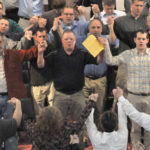Reform of our country’s tax code is necessary, but prudence and not speed should govern the process. Congressional leaders vow to pass a tax reform bill by the end of November, just three weeks from now. Why the hurry? Why should a law that impacts everyone in the United States be carried out like a speed-reading contest?
Proposals fluctuate from day to day, but the bedrock components of this hurried reform effort are simplifying the tax code and tax relief for corporations and individuals. Delving through the details is essential — for members of Congress and for us, their constituents — to ensure that our tax code serves the common good.
The Catechism of the Catholic Church states that “Certainly it is the proper function of authority to arbitrate, in the name of the common good, between various particular interests; but it should make accessible to each what is needed to lead a truly human life: food, clothing, health, work, education and culture …” (No. 1908).
Sen. Charles Grassley, R-Iowa, believes the tax reform plan would benefit Iowans: “It would try to treat small business and individual farm operations a little more fairly compared to C corporations,” he says in a Sept. 27 article on radioiowa.com. But Grassley, a member of the Senate Finance Committee, also expressed concern about raising taxes on lower-income people. Tax reform proposals call for tax brackets to be reduced to three or four, with the bottom rate increasing from 10 percent to 12 percent, Radio Iowa contributor Bob Fisher reports. “Why would you want to raise taxes on lower-income people,” Grassley asks. Good question!
In separate letters to the U.S. House and Senate, Bishop Frank Dewane, writing on behalf of his fellow bishops, outlined moral principles to assist Congress in its deliberations on possible tax reform. Here’s a brief look at those principles:
• Care for the poor. As the poor struggle to meet their daily needs, programs designed to support them and lift them out of poverty must be adequately funded.
• Family formation and strengthening. Maintain instruments of the tax code that benefit families, such as the Child Tax Credit and the Earned Income Tax Credit. The credits should be increased and made refundable. Removing financial barriers to marriage is also essential to family formation and well-being.
• Progressivity of the tax code. The tax burden should be apportioned according to the means of individuals and families as well as the economic inequality present in society.
• Adequate revenue for the sake of the common good. The public needs of society, especially the basic needs of the poor, must be met. Adequate revenues should be raised to meet that need.
• Avoiding cuts to poverty programs to finance tax reform. Current proposals could result in steep cuts to the social safety net and discretionary programs that serve those in poverty. Those measures should be avoided.
• Incentivize charitable giving and development. Current proposals could have an adverse impact on charitable giving. Tax credits that would encourage the development of such important programs as affordable housing also appear to be at risk. These proposed measures would create a heavy burden for the most vulnerable people.
We don’t have to be tax code experts to make our voices heard on tax reform. The first step is to educate ourselves by reading a variety of sources about tax reform efforts. A good place to start is the U.S. Conference of Catholic Bishops website: usccb.org. Another resource is a blog of the USCCB’s Department of Justice, Peace and Development: togoforth.org, which was inspired by Pope Francis. Read about one parish’s model for examining the federal budget on this blog. Also, visit the website congress.gov to read the latest on legislation and to contact our members of Congress. Another resource that provides Iowans with state and national resources and perspectives: the Iowa Catholic Conference
website: iowacatholicconference.org.
Our bishops offer wise advice concerning tax reform, with the bottom line being that it protects the life and dignity of all. How we get to that point depends on our willingness to foster relationships with one another so that together we can build up our nation.
Barb Arland-Fye, Editor
Arland-fye@davenportdiocese.org

The Catholic Newspaper of the Diocese of Davenport









